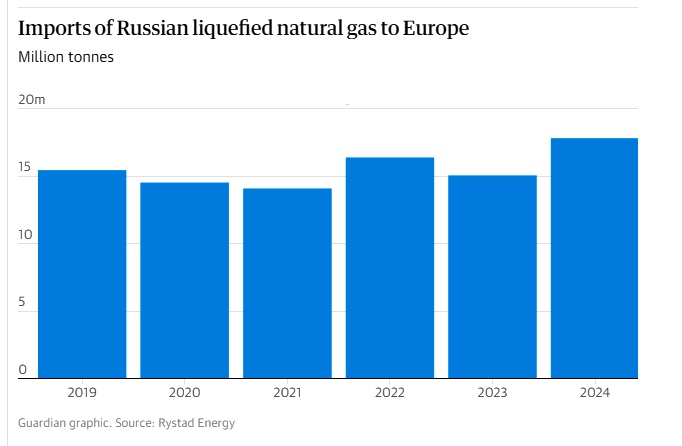
Rystad Energy releases data days after Ukraine stopped flows of Russian gas through its pipelines, ‘The Guardian’ writes.
Europe bought a record amount of liquefied natural gas from Russia last year, data shows, despite EU efforts to ditch the fossil fuels funding Putin’s war chest.
Ships carrying 17.8m tonnes of ultra-cold Russian gas docked in European ports in 2024, up by more than 2m tonnes from the year before, according to analysts Rystad Energy.
Jan-Eric Fähnrich, a gas analyst at Rystad Energy, said LNG flows were not only on the rise but “at record levels”.
Europe has slashed its vast imports of piped Russian gas since the start of the Ukraine war but has increasingly bought shipments of LNG from a number of countries, including Russia. Last year, it overtook Qatar as Europe’s second-biggest supplier of LNG, behind the US.
In 2024, Europe brought in 49.5bn cubic metres (bcm) of Russian gas through pipelines, and a further 24.2bcm in cold liquid form on ships, according to Fähnrich. Some of the LNG will have been resold to other countries, he added.
The figures were revealed days after Ukraine stopped flows of Russian gas through its pipelines, ending a Soviet-era energy route that had survived three years of full-scale war between the neighbours.
Data from the Centre for Research on Energy and Clean Air (Crea), whose figures differ slightly from Rystad’s, showed EU imports of Russian LNG came to €7.32bn in 2024. It found a 14% year-on-year rise in volume that brought imports to 17.5m tonnes.
“The reason for the rise is fairly simple,” said Vaibhav Raghunandan, a Russia analyst at Crea. “Russian LNG is offered at a discount to alternative suppliers… With no sanctions imposed on the commodity, companies are operating in their own self-interest and buying increasing quantities of gas from the cheapest supplier.”
The EU aims to stop importing Russian fossil fuels by 2027 but it has been reluctant to ban gas as it has done for coal and oil. In June, member states agreed to ban the “transshipment” of Russian LNG that goes on to non-EU countries from March 2025. The recent rise in Russian LNG imports may have been driven up by efforts to ship volumes before sanctions hit, said Fähnrich.
read more in our Telegram-channel https://t.me/The_International_Affairs

 11:39 14.01.2025 •
11:39 14.01.2025 •






















